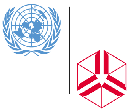
network of research and training centres and programmes
Issue 23: February 2003
 |
UNU Update | |
| The newsletter of United Nations
University and its network of research and training centres and programmes |
||
|
Issue 23: February 2003 |
||
|
UNU/IAS to host indigenous UNU Institute of Advanced Studies (UNU/IAS) has been selected to host the International Indigenous Peoples Initiative on Intellectual Property Policy. The project was launched in Bellagio, Italy, last November during the second meeting of The Call for the Earth Circle steering committee, a group formed to hold extended discussions and deliberation on intellectual property rights (IPR) policy affecting indigenous peoples. The International Indigenous Peoples Initiative on Intellectual Property Policy is designed to increase participation of indigenous peoples in dialogues regarding their traditional knowledge and the intellectual property rights regime. The initiative was launched a second time on December 13 at the World Intellectual Property Organization (WIPO) headquarters in Geneva during the fourth session of WIPO’s Intergovernmental Committee on Intellectual Property and Genetic Resources, Traditional Knowledge and Folklore. A platform for international policy process, the intiative will bring together communities and organisations, research scientists, IPR experts, human rights advocates, farmers and other groups and individuals from within both indigenous and non-indigenous circles throughout the world to hold dialogues on IPR issues concerning indigenous peoples. The initiative has a three-year lifespan incorporating national and regional deliberations on three main themes:
Other activities will focus on creating a knowledge base on IPR and indigenous peoples, capacity development, documentation, dissemination and updating information. The initiative is being funded by the Rockefeller Foundation. |
|
Copyright © 2003 United Nations University. All rights reserved. |